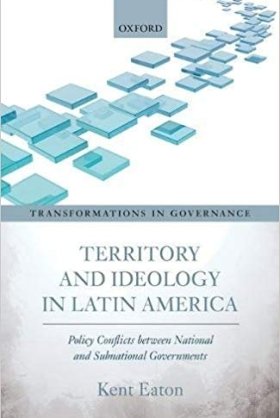Territory and Ideology in Latin America: Policy Conflicts between National and Subnational Governments


Around the world, familiar ideological conflicts over the market are becoming increasingly territorialized in the form of policy conflicts between national and subnational governments. Thanks to a series of trends like globalization, democratization, and especially decentralization, subnational governments are now in a position to more effectively challenge the ideological orientation of the national government.
The book conceptualizes these challenges as operating in two related but distinct modes. The first stems from elected subnational officials who use their authority, resources, and legitimacy to design, implement, and defend subnational policy regimes that deviate ideologically from national policy regimes. The second occurs when these same officials use their authority, resources, and legitimacy to question, oppose, and alter the ideological content of national policy regimes. The book focuses on three similarly-situated countries in Latin America where these two types of policy challenges met different fates; neither challenge succeeded in Peru, both succeeded in Bolivia, and Ecuador experienced an intermediate outcome marked by the success of the first type of challenge (i.e. the defence of a deviant, neoliberal subnational policy regime) and the failure of the second (i.e. the inability to alter a statist national policy regime). Derived from the in-depth study of these countries, the book's theoretical argument emphasizes three critical variables: 1) the structural significance of the territory over which subnational elected officials preside, 2) the level of institutional capacity they can harness, and 3) the strength of the societal coalitions they can build both within and across subnational jurisdictions.
Transformations in Governance is a major new academic book series from Oxford University Press. It is designed to accommodate the impressive growth of research in comparative politics, international relations, public policy, federalism, environmental and urban studies concerned with the dispersion of authority from central states up to supranational institutions, down to subnational governments, and side-ways to public-private networks. It brings together work that significantly advances our understanding of the organization, causes, and consequences of multilevel and complex governance. The series is selective, containing annually a small number of books of exceptionally high quality by leading and emerging scholars.
The series targets mainly single-authored or co-authored work, but it is pluralistic in terms of disciplinary specialization, research design, method, and geographical scope. Case studies as well as comparative studies, historical as well as contemporary studies, and studies with a national, regional, or international focus are all central to its aims. Authors use qualitative, quantitative, formal modeling, or mixed methods. A trade mark of the books is that they combine scholarly rigour with readable prose and an attractive production style.
Author

Professor of Politics, University of California, Santa Cruz

Latin America Program
The Wilson Center’s prestigious Latin America Program provides non-partisan expertise to a broad community of decision makers in the United States and Latin America on critical policy issues facing the Hemisphere. The Program provides insightful and actionable research for policymakers, private sector leaders, journalists, and public intellectuals in the United States and Latin America. To bridge the gap between scholarship and policy action, it fosters new inquiry, sponsors high-level public and private meetings among multiple stakeholders, and explores policy options to improve outcomes for citizens throughout the Americas. Drawing on the Wilson Center’s strength as the nation’s key non-partisan policy forum, the Program serves as a trusted source of analysis and a vital point of contact between the worlds of scholarship and action. Read more




